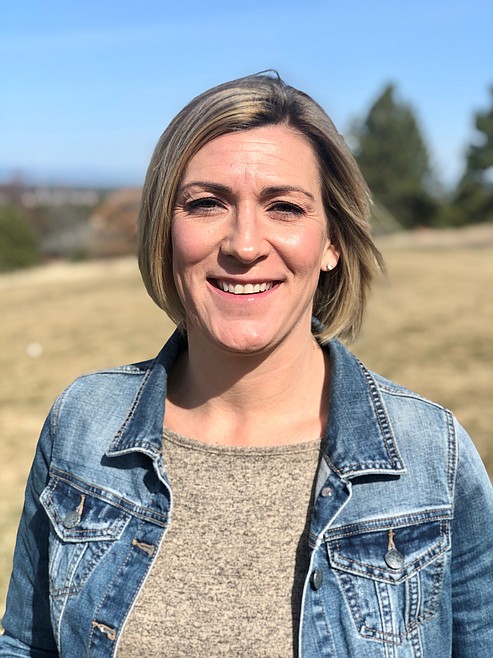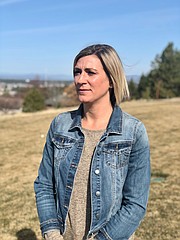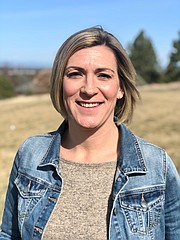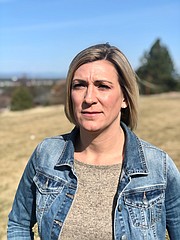FAST FIVE: You have a safe place with Chauntelle Lieske
Meet Chauntelle Lieske. She was born in Delaware and moved to the Pacific Northwest about 15 years ago with her husband who is in the Air Force. Chauntelle is the executive director of Safe Passage, our local nonprofit that helps victims of domestic and sexual violence. She is a passionate advocate for survivors and believes as a community we can prevent families from experiencing violence. When Chauntelle is not advocating for survivors, she is spending time on Priest Lake with her family.
Generation: I don’t really describe myself in generational terms, but by definition I am an old millennial born in January of 1981. I would say I do sit somewhere between Gen X and millennial.
Career and community involvement: I have been working in the domestic and sexual violence field for about the past 15 years, starting with the YWCA of Spokane when we moved to the PNW. Before I worked with domestic and sexual violence survivors, I did child abuse investigations for the state of Delaware for about three years. At the YWCA, I started as an advocate who attended court hearings with victims whose abusers had been arrested. I eventually moved into a manager role and kept moving in management until I found myself as the executive director of Safe Passage. Over the past several years I have tried to become more involved in the community. I sit on the board for the Idaho Coalition Against Domestic and Sexual Violence, which is an agency that provides support and resources for the domestic and sexual violence agencies around the state like Safe Passage. I am also a member of Soroptimist and the Coeur d’Alene Rotary.
Parental status: I have two children: Ray, who is 8, and Macie, who is 6.
1. April is Sexual Assault Awareness and Prevention Month, so what does that mean and why should people care?
Sexual assault awareness and prevention means exactly that. We should continue to learn about sexual assault and the impact it has on survivors as well as learning ways we as community members and businesses can help to prevent it from happening. Sexual assault is much more common than people think. When you break down the statistics, one in five women have been raped at some point in their lifetime, which means more than likely each of us knows someone who has experienced rape. When people say they don’t know anyone who has experienced rape my answer often is, “That you know of." We know survivors are very good at keeping secrets. It’s incredibly scary to disclose that you have been a victim, for many different reasons. This is why I don’t think we should put that burden on those who have been affected. We as a community should talk about sexual violence and come up with ways to support survivors and ways we can prevent it from happening in our communities.
2. Why is it so hard for someone to leave an abusive partner, and what can we do as friends and loved ones when someone we know is in that position?
It’s hard to leave an abusive relationship for many reasons that vary based on the person, the relationship and the violence that has been experienced. The reasons are on a spectrum. Some of our survivors don’t want to leave because they love their abuser and want to fix the relationship and keep their families intact. Other survivors can’t leave because their abuser has threatened them that if they leave the violence will get worse. There are also barriers to leaving such as financial means. If an abuser has taken access to the finances it is very difficult to afford a new place to live. We can be supportive by understanding they are making some of the hardest choices of their life. Often stepping back and letting survivors make the choices on their own will be the best support we can give them. When survivors are forced into something they are not ready for we can compromise the safety of that person. Letting them know you are there to support the choices they are making and offering resources like Safe Passage is a great way to help.
3. Why did you pursue a career helping people who have been victims of domestic violence or who are currently in crisis?
To be honest, I fell into this work. I was looking for a job when we moved here and saw the advocate job in the paper. I applied and started as an advocate at the YWCA. It wasn’t until I started with that position that I fell in love with this work. While I was an advocate, I learned that I was one of the only women in my family who had not been a victim of violence. I also learned so much about my childhood and how strong my mother had been. This was when I knew this was the work I wanted to continue to pursue. The more I learn about ways we can prevent domestic violence homicide and the prevalence in our communities, the more I want to do and advocate on behalf of survivors. I think domestic and sexual violence continues to be one of the biggest misunderstood issues in our country. There is so much we can do to support those who have experienced violence, as well as put programs in place for our children to prevent it from ever happening.
4. What is something people would be surprised to learn about you? I am obsessed with true crime podcasts.
5. What can we as a community do to be aware of domestic violence situations and help those in need?
We can be aware that it happens more often than we think and it can happen to anyone. Know that there are resources available and trained advocates to provide resources and safety planning for survivors.







